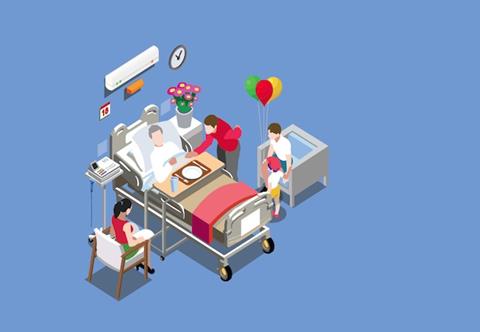
Need to know:
- Cancer checks can be offered as part of a successful health and wellbeing programme.
- Workplace cancer checks can incorporate checks that are outside of the typical NHS screening procedures.
- Awareness campaigns featuring presentations, employee literature and webinars can help to educate staff on common cancer symptoms, contributing to early detection.
Although cancer treatments are growing more advanced by the day, prevention and early detection are still vital in the fight against the disease.
Knowing how to broach cancer as part of a health and wellbeing programme, and how to support employees who are given a cancer diagnosis, is becoming an increasingly prevalent issue in the workplace.
How can employers make a difference?
One way in which organisations can support staff with early detection is through the provision of cancer checks. Chris Bailey, partner at Mercer, says: “The gold standard says that cancer checks are included as part of a range of measures, not just on their own. Clearly, there is a huge opportunity there for the employee value proposition; there is no downside to caring about employees’ health and wellbeing so it’s such a strong statement, it is inherently a positive thing to do.”
Increasing public awareness of cancer has also contributed to a shift in focus in workplace cancer support. Crispin Lennox, corporate business manager at Lifescan UK, says: “Prevalence is increasing and we are far more aware of the likelihood of cancer. Historically, employers have been using wellness screening, which is brilliant, but we are now thinking about early detection and prevention.”
Although the NHS provides screening for bowel cancer, breast cancer and cervical cancer for people in certain age ranges, workplace cancer checks have the scope to delve much more deeply into the array of tests available for numerous forms of cancer, which can include skin and prostate cancer.
Many providers offer these checks funded through a salary sacrifice arrangement, on an employer-paid basis or via a flexible benefits scheme, ensuring that organisations can tailor their specific requirements to the demographics of their workforce. While some employers may opt to offer checks though a salary sacrifice arrangement, employees tend to prefer employer-paid checks, says Troels Jordansen, managing director at Check4Cancer. He adds that these often see higher take-up because there is no cost to the employee and the services are generally on site for ease.
Claire Barlow, managing director at Lifescan UK, says: “It comes down to [organisation] size and structure. Both methods demonstrate that the employer is supporting this as a benefit so this is far and away more successful than voluntary schemes.”
Prevention and awareness
Prevention is also something employers can get involved with, especially as lifestyle factors are known to have a cause-and-effect link to some cancer diagnoses. “An employer can play a really strong role in providing education and because the employer controls the environment that people spend their working lives in, [it] can actually make some really helpful changes to encourage healthier lifestyles in the workplace,” says Bailey.
There are numerous ways that employers can take advantage of the schemes offered by cancer check providers. As well as traditional awareness campaigns, providers may offer to run webinars or set up informative websites, for example. However, one of the most common and effective methods employed is a face-to-face presentation. This method can help staff to understand symptoms and risks, and what they can do to lower these risks. This know-how is invaluable because it could not only help the employee themselves, but it also allows them to spot symptoms in family and friends they interact with on a daily basis, says Jordansen.
Supporting diagnosed employees
“When you have an employee who has been diagnosed with cancer, it is an incredibly traumatic experience,” says Jordansen. “The good employers will make sure there is a network available.”
Education, training and support for line managers is also key. “It’s a really tough area for a line manager to get right, so I think it’s important to educate line managers as to how to behave and how to manage, to understand the issues the individual is likely to be going through,” says Bailey. “Education is helpful, counselling techniques, and understanding HR policies that are around time off or rest breaks, can all be very helpful.”
As well as negotiating aspects such as part-time working, organisations should ensure they have well-thought-out and succinct HR policies in place, as well as manager training, to aid staff returning to work on a flexible basis if needed, says Dr Doug Wright, medical director at Aviva. Laying down this administrative groundwork can help to support return to the workplace, for both the employee and their manager.
Cancer checks can play an important role in corporate health and wellbeing programmes, with a set focus on early detection and the potentially life-saving impact this can have on an employee, as well as the awareness it can raise for both staff and their families.

Lendlease offers on-site cancer checks to staff
Property solutions organisation Lendlease has developed a wide-ranging health and wellbeing programme, tailoring the schemes offered to reflect the results gathered from staff surveys and employee health checks.
With health check results from autumn 2013 and autumn 2015 showing that 53% of employees did not protect their skin in the sun, the organisation sought to develop an initiative to address this issue. Gemma Bourne, head of social sustainability and the Lendlease Foundation at Lendlease, says: “We wanted to raise awareness of the importance of checks and then also provide the provision to bring checks in house to give our employees access to something they wouldn’t necessarily get on the high street.”
As a result, Lendlease launched a cancer prevention measure, provided by Check4Cancer, as part of its existing health and wellbeing scheme, initially focusing on skin cancer. “After the first year of trialling it, we had to double the number of appointments available because take-up was so high,” says Bourne. “We have about 500 employees a year do [the skin cancer check], so it’s about 40% of our head count in this region.”
Off the back of this success, the organisation launched prostate checks in 2015. “Given the industry that we work in, it is predominantly male so we wanted to do something targeted around men’s health,” Bourne explains.
The targeted programme is designed for men over 40 and although the population pool is quite small, the organisation has seen 70% of applicable staff take up the prostate check.
The scheme is promoted through text messages, emails, posters and messages on the staff intranet. Bourne attributes the scheme’s success to its convenience. She says: “One of the reasons [the schemes] are so successful is because through service providers such as Check4Cancer, they are able to come to our project offices and on site so they are set up in our site cabin. We make it easy to do.”
The skin cancer checks are available at all of the organisation's offices and construction projects during the spring and summer, and the prostate cancer checks are available through the winter.

Viewpoint: Employers need to consider reasonable workplace adjustments for employees with cancer
Because of the increasing rate of cancer diagnoses, it is very likely that most employers will face this scenario with a member of staff at some stage.
Employers should be aware that under the Equality Act, cancer is classed as a disability from the point of diagnosis. Therefore, the employee is legally entitled to reasonable adjustments at work to counter any difficulties they may be having as a result of their diagnosis. It also means that employers have to adjust work performance targets to reflect the illness.
For some people, continuing to work after a cancer diagnosis is therapeutic in that it maintains some normality for them at a time of uncertainty in their lives. Many have little option due to financial reasons.
Depending on the treatment they are undergoing, some employees will be able to work throughout, while others may feel too unwell. If an employee wishes to work, reduced hours or lighter duties are a good way forward.
The key for both parties is effective communication throughout. Employers should be sympathetic to not only the physical effects of cancer treatment, but also the significant psychological impact of the diagnosis. It is vital to understand that once treatment ends, even with a good prognosis, the emotional trauma may continue for a considerable time.
It is common for family, friends and colleagues to think that once treatment is complete, the person with cancer should be able to just snap back into normal life. Unfortunately, this is very rarely the case because it is often only at this stage that they begin to process all they have been through. Talking therapies can be beneficial at this time and employers should be sympathetic to time off for counselling appointments to aid their employee’s recovery.
Employers should be proactive in encouraging staff to take responsibility for their own wellbeing by participating in schemes that are available for early detection, for example, bowel and breast screening. Employers may wish to consider providing well-woman or well-man checks as part of the remuneration package because these may be useful in early diagnosis, which is of benefit to both workforce and employer.
Lorna Ellis is cancer support centres manager at Helen Rollason Cancer Charity











